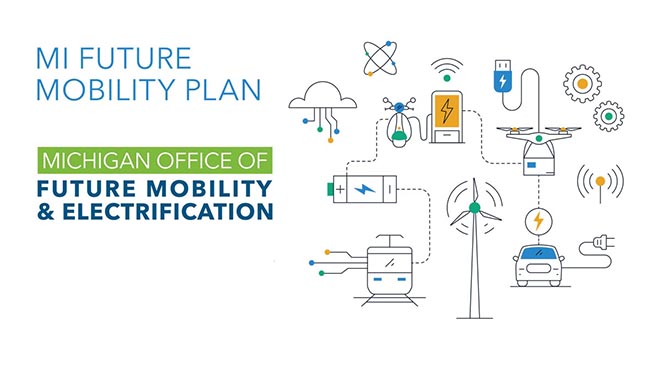
Michigan is poised to remain a leader in transportation technology thanks to its legacy of long-standing relationships with key U.S. automakers, according to a new article from Newsweek.
“For years U.S. automakers have been putting lots of money into developing digital technology, ranging from drivetrains and batteries for electric vehicles (EVs) to a broad range of hardware and software connecting cars to the internet and to make them self-driving,” says Jake Lingeman, author of the article. “Increasingly that money is being invested close to U.S. automaking's ancestral home.”
The article covers the contributions Ford Motor Company, Stellantis and General Motors (GM) have made to make Michigan an integral part of their mobility and software engineering advancements.
Automakers Invest in Future Success
Ford has focused funding in the downtown Detroit area with the creation of the Michigan Central Innovation District. The company bought the historic Michigan Central Train Station in 2018 to act as an anchor for the 30-acre campus to act as a hub for talent, mobility innovation, entrepreneurship, sustainability, affordable housing, small business opportunities and community engagement.
Google, who recently joined the project, will work with Ford to help develop the future of mobility in Michigan.
“This partnership will expand our work in Michigan and help a substantial number of people gain the skills and tools they need to succeed,” said Google CFO Ruth Porat. “By offering digital skills training, mentoring to high schoolers learning to code, and Google Cloud technology for Michigan Central projects and research on the future of mobility, we look forward to contributing to Michigan Central’s mission and all it will accomplish.”
So far, Ford has invested $740 million to develop the campus. This investment was a precursor to a pledge of another $2 billion the company plans to spend in the state, which will create more than 3,200 new jobs.
Stellantis has also set its sights on an increased presence in Michigan, according to the Newsweek article. In 2021, the company expanded its user experience and design groups. Once only focused on Silicon Valley, the company has since formed a new “Software Experience” team in Michigan.
"The Detroit area is becoming a center of competence for user experience technology and many of the suppliers that exist in Silicon Valley now have representation in Michigan," Vince Gallante, Stellantis vice president of global user experience design. "We're supporting all 14 of Stellantis' brands with hires from Apple, Disney, and Microsoft."
Further building on Michigan’s leadership in the mobility and automotive industries, General Motors (GM) announced a $7 billion investment in Michigan, the largest in the company’s history. The investment was recognized as part of the Deal of the Year awards in Business Facilities’ 2022 Impact Awards in the category of Electric Vehicles.
"We appreciate this recognition that innovation is part of the Michigan DNA. Team Michigan is proud to celebrate this national and global recognition in 2023,” said Quentin Messer, Jr., Michigan Economic Development Corporation (MEDC) CEO. “We must work to retain our position and Team Michigan is committed to this work. Each investment is a vote of confidence in our innovation culture, the continued strength of our talented workforce, and builds on our commitment to winning the future of mobility.”Michigan’s Forward Momentum
U.S. automakers aren’t alone in looking to Michigan for industry-leading support. Across the mobility sector, the state saw plenty of other EV and battery investments to celebrate:
- In March 2022, LG Energy Solution announced a $1.7 billion expansion creating 1,200 jobs in Holland manufacturing batteries.
- In June 2022, Canadian EV charging network operator FLO announced an investment of $3 million for the company’s first-ever U.S. manufacturing facility in Auburn Hills.
- In October 2022, Michigan-based Our Next Energy announced a $1.6 billion investment to establish its first cell and EV battery pack gigafactory in Van Buren Township, creating up to 2,112 jobs.
- In October 2022, Gotion announced a $2.36 billion investment for a new manufacturing facility in Big Rapids, creating up to 2,350 jobs.
This positive news builds on the recognition that Michigan has already been gathering in the first weeks of 2023. CNBC reported that Michigan is among the three states that will lead electric battery manufacturing in the U.S. by 2030. Michigan also rose to No. 14 overall in Area Development’s 2022 Top States for Doing Business rankings, following a survey of experts highlighting states ready for doing and growing business.
Michigan’s history of automotive industry success coupled with economic support, investment attraction and talent development make it a destination for the industry for years to come.
Learn more about how Michigan is supporting the future of mobility.
About Michigan Economic Development Corporation (MEDC)
The Michigan Economic Development Corporation is the state’s marketing arm and lead advocate for business development, job awareness and community development with the focus on growing Michigan’s economy. For more information on the MEDC and our initiatives, visit www.MichiganBusiness.org. For Pure Michigan® tourism information, your trip begins at www.michigan.org. Join the conversation on: Facebook Instagram LinkedIn, and Twitter.
On the same topic here was Michigan Governor Witmer's reaction:
|
ICYMI: U.S. Automakers Aim to Make Detroit Next Silicon Valley LANSING, Mich. — In a new piece from Newsweek, Michigan is recognized as a leading hub for high-tech mobility development and manufacturing. Since 2019, Michigan has announced 30,000 new auto jobs, expanded investments in critical industries manufacturing chips and batteries, and revamped our economic competitiveness with a bipartisan plan to attract businesses to the state. These record investments have led to Michigan being named one of three states poised to “dominate” electric vehicle battery manufacturing in the United States by 2030 in a new report. Governor Whitmer will continue to work with anyone to build on Michigan’s strong economic momentum and leadership role in the future of mobility and electrification. For years U.S. automakers have been putting lots of money into developing digital technology, ranging from drivetrains and batteries for electric vehicles to a broad range of hardware and software connecting cars to the internet and to make them self-driving. Increasingly that money is being invested close to U.S. automaking's ancestral home. Ford Motor Company, General Motors (GM) and Stellantis, the multinational whose 14 brands include Chrysler and Jeep, have all funded mobility and software engineering projects in Michigan lately.
Silicon Valley has noticed. Christian D. Malesic, president/CEO of the Silicon Valley Central Chamber of Commerce, says "We're still number one in angel investors.... But I can also see the tech industry of Michigan expanding, especially as the car and computer start to blend even more."
[…]
Recently Ford has turned its funding attention to Michigan with major investments in the downtown Detroit area, focusing on building a creative and technological base of operations near its home in Dearborn. The company spent $90 million buying the Michigan Central Station in the Corktown neighborhood of Detroit in 2018 with plans to turn it into a hub of mobility, automation and electrification. The development will also feature new public amenities for local residents like green spaces, walking and biking trails and public art. Last February, Google joined the project.
[…]
"The Detroit area is becoming a center of competence for user experience technology and many of the suppliers that exist in Silicon Valley now have representation in Michigan," Vince Gallante, VP of global user experience design at Stellantis tells Newsweek. "We're supporting all 14 of Stellantis' brands with hires from Apple, Disney and Microsoft."
[…]
Meanwhile, GM has invested $4 billion to convert its Orion Township assembly plant to the production of full-size EV pickups and up to $2.5 billion to build an Ultium battery cell plant in Lansing as part of a joint venture with South Korea's LG Energy Solution. To support the investments, the state-run Michigan Strategic Fund approved a $600 million grant for the creation of up to 4,000 jobs related to the two projects.
In addition to its Ultium partnership with GM, LG is also opening battery manufacturing facilities in Holland, Michigan. According to LG, the state was chosen over competing sites in the southeast U.S. and overseas. According to a recent CNBC report, Michigan, along with Georgia and Kentucky, are poised to dominate U.S. electric vehicle battery manufacturing by 2030.
[…]
The investments in Michigan go beyond traditional automaking, with dozens of upcoming projects—including solar panels, electric vehicle chargers and a road that charges EVs as they drive on it—set to be funded with federal money from the Biden Administration's Inflation Reduction Act. The new law also includes a range of tax credits for buyers of EVs.
"Our governor and industry leaders fundamentally believe that you can build a stronger state economy through safer, more equitable and environmentally sound transportation for all residents. And that involves industry growth," Pawl says. "But that also involves community vitality. It also involves using the technologies being developed in your state, by your brightest people to solve real problems in our communities, not just in Detroit or Flint or Battle Creek, but in northern Michigan."
Electric Vehicle and Battery Project Wins In 2022 alone, Michigan secured more than $14 billion of investment in the auto industry, cementing our position as a global leader in manufacturing and production. Transformational electric vehicle and battery investments in Michigan in 2022 include:
### |














